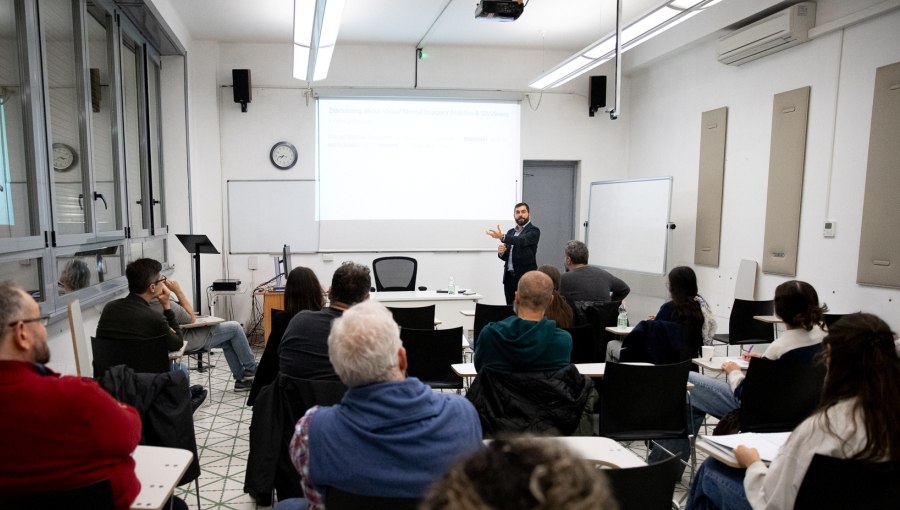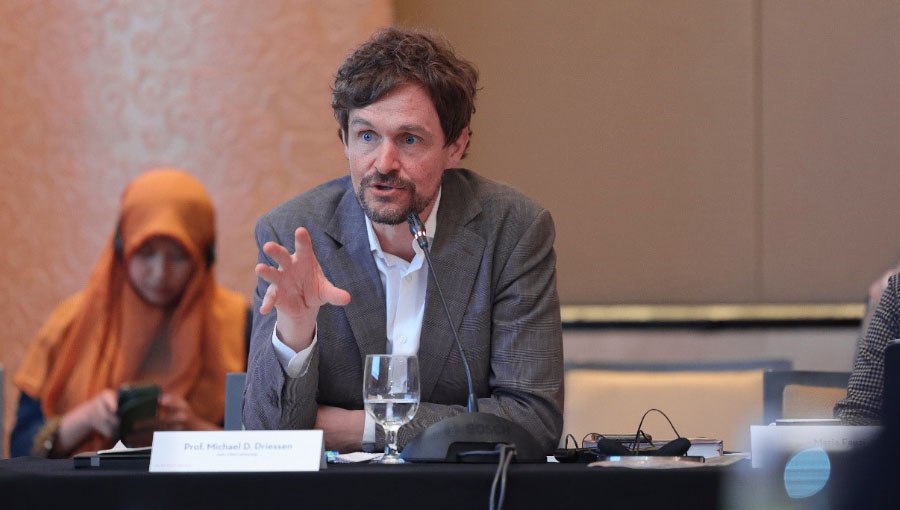Promoting Climate Action: JCU Hosts TEDxJohnCabotUniversity
The best time to act was yesterday, the second best time is today. (Why act now?, TED Countdown)
John Cabot University had the pleasure of hosting TEDxJohnCabotUniversity on October 18, 2020, as part of the global launch of the TED Countdown initiative. The independently organized online event, licensed by TED, featured members of the JCU community and TED Countdown Talks.
TEDxJohnCabotUniversity focuses on promoting climate action through change-makers, educators, and entrepreneurs within academia.
The Countdown initiative, which takes place in over 90 countries, brings together many creative people to find solutions for climate change. It seeks to “champion and accelerate solutions to the climate crisis, turning ideas into action,” and aims to empower local communities to act on climate change.
Pollution and “net zero”
Every year, 55 billion tons (gigatons) of greenhouse gases are released into the atmosphere. The major air polluting sectors are energy, transport, industry, and food, but the exploitation of nature also plays a big role. Twenty countries are responsible for 75 percent of global emissions. Scrubbing greenhouse gases out of the air will cost future generations eight trillion dollars a year, which is almost half of the entire US economy today.
As a consequence of air pollution, some of the threats that the world is facing include rising sea levels, which are expected to increase by one meter over this century and up to two meters if we include the melting glaciers in the Arctic and in Antarctica. Melting glaciers might also compromise the ocean’s ecosystem and its food chain. Moreover, if carbon stores like forests and permafrost flip to producing it instead, stabilizing global temperatures will become even harder. And if one system starts collapsing, it is very likely that the others will follow causing a domino effect, as they are all interconnected.
The term “net zero” means that for every molecule of greenhouse gas released into the air, we also take one out, making our net emissions zero. According to scientists, the world is reaching a tipping point and we need to cut global emissions by half in the next 10 years in order to stop global warming and for climate change to be reversible. It is also essential to reach net zero by 2050 or sooner. This could be achieved through a decarbonization of the systems that run our lives, such as energy and transport. It would require replacing all greenhouse gas emitting activities with clean and sustainable ones. It would also be necessary to capture greenhouse gases from the air and store them permanently in secure locations such as underground geologic formations.
Possible solutions
Throughout history, annual emissions have never decreased. Yet, the world now needs to reduce its annual emissions by about 10 percent. Despite this being a massive task that would require the entire system to change, there are various ways to go about it. It would be necessary to develop electric alternatives to things that pollute the environment, such as factories. Solar and wind energy should become the primary choice. Additional research on clean renewable energy and technology should be promoted and fossil fuels such as coal and gas should be used less, and eventually be completely replaced.
Despite being one the most polluting countries, China came up with a five-year plan to reduce the number of diesel-powered buses. Shenzhen was the first Chinese city to have an entirely electric bus fleet, and about 40 thousand charging stations. More than 30 cities in China have made plans to have fully electric public transportation in the next few years. As a result of its five-year plan, China currently has 420 thousand electric buses, while the United States has only 600. According to climate policy expert John Doerr, and engineer and investor Hal Harvey, the world needs to come up with a cohesive plan for the coming years that includes policy campaigns, technology entrepreneurs, and key objectives and results.
The impact of universities
“We are in a war against ourselves, and we are losing,” said Giacomo Di Capua, climate activist and President of Grassroots, the JCU environmental club. According to John Kotter’s eight-step change process outlined in his 1995 book Leading Change, the first two things to do are creating a sense of urgency and forming a powerful coalition. Di Capua believes that universities are the ideal place to share a sense of climate urgency and to actively advocate for it, as they allow for climate-conscious educators and activist students to come together. Universities cannot be the only agents of climate action, but they can engage in discussions with organizations, firms, startups, and informal groups that are already involved in climate activism. He gave the example of the Global Climate Letter, signed by over 300 institutions and networks of higher education from across the world that collectively committed to reach net zero by 2030.
Di Capua worked on a project with a team of university students in which they aimed at mapping all the climate actors in the city of Rome. In less than two months, they were able to identify more than 70 actors, and then proceeded to create the “Council of Sustainability,” an inter-organizational platform that aims to empower its components through “know-how sharing, information pooling, and targeted synergies,” with universities being the core catalyzers of all these processes. Among other things, the platform allows to submit policy proposals that can then be presented to regional and/or national representatives. “Don’t ever be afraid to voice your fears for our common future. Social change can thrive if, and only if, we manage as a species to convey a sense of urgency,” said Di Capua.
Luca Azzariti Crousillat, President of the JCU Student Government, talked about how students are one of the main actors of change and mentioned some of the environmental activities organized by John Cabot’s clubs. The Grassroots club managed to plant 4437 trees through “The JCU Community Forest” initiative, and to reduce plastic usage in the University by liaising with the administration, which then distributed aluminum water bottles and removed plastic cups and bottles from all its campuses. The Fashion club raises awareness on issues such as fast fashion, and the impact that production facilities and waste products have on the environment. The Business club promotes the discussion of environmental issues in business classes and fosters environmental startups. The JCU Student Government advocates for food sustainability, carbon management, and environmental education.
The role of educators
“The lack of experience and knowledge was the initial condition for climate change,” said Francesco Lapenta, Founding Director of the JCU Institute of Future and Innovation Studies. When a new technology emerges, it is fundamental to be able to foresee what its impacts could be. Out of 7.6 billion people, 1.2 have little to no access to electricity. Only five countries account for 80 percent of the global consumption of energy. When thinking about a solution for climate change, it is important to consider an option that is sustainable and scalable, and that can be adopted and implemented by all societies worldwide, allowing all the people around the world to benefit from it.
According to Lapenta, a multi-stakeholder approach is the best way to tackle the issue of climate change. Cooperation and collaboration between different agencies is of the utmost importance in order to find a balance between everyone’s interests, as this is the only way for the entire system to evolve. “The ability to project, organize and articulate this transformation through several decades is perhaps one of the fundamental functions of the leaders of tomorrow,” said Lapenta, who believes that the role of education in bringing about this transformation is pivotal. Universities should try to educate students and future leaders to understand the complex dimensions of this transformation process, and make sure that they will be able to take into consideration different elements and foresee possible challenges.
According to Silvia Carnini Pulino, Associate Professor and Director of the JCU Institute for Entrepreneurship, an entrepreneurial mindset is essential for developing possible solutions for climate change. An entrepreneurial mindset is composed of “transversal skills that help people think creatively, identify opportunities, and then put together the resources necessary to make the project happen,” said Pulino. “Italy Starts” is a mentoring program developed by the JCU Institute for Entrepreneurship that has the objective “to encourage cross-cultural learning between undergraduate students with a foundation in entrepreneurship or business, and Italian high school students, within the broad spectrum of entrepreneurship-focused mentoring.”
Jade Burr, an Italy Starts Mentor to high school students shared her experience of how the qualities of empathy and cultural awareness are developed in both university and high school students when there is collaboration with these near peers.
The 2020 edition of Italy Starts had an environmental theme and aimed at conveying to participants the idea that they can become agents of change. An example of a project developed within the program is the Garbage-ly App, co-created by JCU student Kennedy Lightbourne. The app is designed to show all the recycling points according to geographic position, and to raise awareness on environmental issues through discussions.
Man has pushed earth to its limits, and today’s crises are all interconnected. The climate crisis has brought about a health crisis as well, as polluted air and water kill millions every year. With sea levels and global temperatures rising, glaciers melting, and all other environmental catastrophes that the world is witnessing in recent years, it is clear that now is the time to act. It is essential to find ways to reduce emissions and to absorb the carbon that is already in the air. The next 10 years will be crucial in determining the state of the planet that future generations will inherit. Universities have a responsibility to raise awareness on environmental issues, and prepare future change-makers for the challenges ahead.
See TEDxJohnCabotUniversity’s full program.







